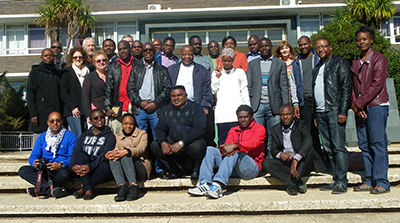Latest News Archive
Please select Category, Year, and then Month to display items
17 June 2020
|
Story Dr WP Wahl

The Division of Student Affairs (DSA) prioritises innovation to meet the challenges of food insecurity and malnutrition among students. To this end, several student volunteers and student governance structures are collaborating with the DSA on various initiatives.
During 2019, various conversations were held about the possibility of creating a health-promoting food environment at the UFS where students and staff are well informed and empowered to take appropriate action regarding their food and nutritional needs. These conversations resulted in an institutional strategy to address the food environment at the UFS. Student representatives serve on a technical committee that directs the implementation of this strategy. In this regard, several initiatives have already been launched.
Students from residences and other student communities have planted vegetable gardens on the Bloemfontein Campus with the assistance of KovsieACT and the Faculty of Natural and Agricultural Sciences. Students and staff are already harvesting and distributing vegetables to needy students every week. Measurements were put in place to continue this during the COVID-19 period. The following vegetables were planted: spinach, cabbage, beetroot, broccoli, cauliflower, and carrots.
Food parcels, donated by Tiger Brands and Gift of the Givers, are continuously handed out by DSA staff and student volunteers. In this regard, 540 food parcels have already been handed out on the Bloemfontein Campus during the COVID-19 period alone. During the same time, 117 students received food parcels on the Qwaqwa Campus. The innovation of this food parcel project rests on the fact that business, NPOs, UFS students, and DSA staff are collaborating to address food insecurity and malnutrition.
More collaborative initiatives will be implemented over the next 12 months. The DSA staff and students are already working with the Department of Dietetics and Consumer Sciences to create information packages about the preparation of low-budget nutritious meals.
Related article:
Vegetable tunnels established to continue the fight against food insecurity
First CAS Winter School brings researchers together
2016-08-01

International and University of the Free State delegates
during the three day Centre for Africa Studies
winter school.
Photo: Supplied
The first biennial doctoral Winter School by the Centre for Africa Studies at the University of the Free State (UFS) brought together UFS PhD researchers as well as current and new Africa Studies students specialising in the Conflict and Peace subfield.
According to Prof Heidi Hudson, Director of the Centre for Africa Studies, this was the aim of the Winter School, hosted in collaboration with the John and Elnora Ferguson Centre for African Studies (JEFCAS) in the Department of Peace Studies at the University of Bradford in the United Kingdom. The Winter School took place from 18-22 July 2016 on the UFS Bloemfontein Campus.
Doctoral students gain deeper insight during school
Prof Hudson said the Winter School was presented to share insights, and develop further understanding of the complex terrain of interdisciplinary studies.
“The School also provided an opportunity for the Centre’s newly-recruited doctoral students specialising in peace and conflict to gain deeper insight into Peace Studies methodologies,” said Prof Hudson.
Why male ex-combatants resort to violent behaviour?
To conclude the Winter School, Prof Donna Pankhurst from the University of Bradford presented a seminar. Her research paper, What is wrong with men? Revisiting violence against women in conflict and peacebuilding, tries to explain why men resort to violent behaviour after the end of combat duty. Prof Pankhurst described her research title as “a wacky title to grab people’s attention”. “This paper is part of a larger study which is exploring the extent to which post-traumatic stress disorder may impact on male ex-combatants' tendency to commit violence against women,” said Prof Pankhurst.